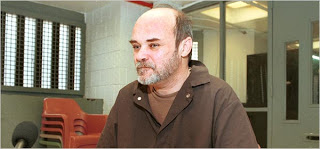Thursday, March 5, 2009
Sentence First, Trial Never

A hoary truism teaches us that crisis reveals character, rather than shaping it. To the extent the word “character” applies to the government ruling us, that maxim certainly applies with respect to the state of permanent crisis we have experienced since 9-11.
The tyrannical practices and powers exhibited in the name of Homeland Security — from aggressive war to torture — are not foreign to the Regime that rules us. The open-ended “war on terror” simply provided an opportunity for the State’s agents to institutionalize official crimes that had been committed on a more informal basis prior to The Day Everything Changed.
At the malignant heart of this system we find the extraordinary claim — now embraced, to the surprise only of the professionally gullible, by Obama the Blessed and his ruling clique — that the president has the power to order the open-ended detention of anyone he designates an “enemy combatant.”
This claim, which was validated by Congress in the Military Commissions Act of 2006, is a de facto repeal of habeas corpus. This is the foundational due process guarantee in the Anglo-Saxon tradition of liberty protected by law, and perhaps the most important concession wrested from King John at Runnymede in 1215.
Absent the protection provided by habeas corpus, rulers can forego such formalities as indictment and trial and simply lock people up until they run out of birthdays. The Bush Regime insisted that the president, through the exercise of a protean, extra-constitutional “commander-in-chief” power, can designate individuals as “enemy combatants” and imprison them indefinitely.
Fear the mullet, but respect due process: Former “enemy combatant”-turned-criminal defendant Ali Al-Marri.
In order to preserve that supposed authority, Bush and his handlers released “enemy combatant” Jose Padilla from military confinement into the civilian criminal justice system in an attempt to avoid a Supreme Court challenge.
Now the Obama administration is pursuing exactly the same course with respect to a case involving a second “enemy combatant,” Ali Al-Marri.
Although media commentators insist that Obama is “likely to handle accused terrorists in a significantly different way” from that followed by his predecessor, the crucial point here is that he, like Bush, is seeking to render Al-Marri’s case moot, which would preserve the presidential claim by default.
The Military Commissions Act was not the only, or even the first, congressional assault on the habeas corpus guarantee. An earlier, and more damaging, attack came in the form of the “Adam Walsh Child Protection and Safety Act of 2006,” which permits the open-ended “civil confinement” of those who are designated “sexually dangerous persons” (a category that sounds a lot like the old Soviet concept of “socially dangerous persons”).
“Civil confinement” is a variation on “civil commitment,” under which the several states, acting on the malevolent doctrine of parens patriae (the “parenthood” of the state), institutionalize the mentally ill for treatment.
As the Soviets demonstrated through their use of pscyhiatry as an enforcement arm of the State (the assumption being that only the mentally ill would dissent from the Party-ordained consensus), this practice is pregnant with awful abuses, one of which is its subtle expansion to include sex offenders who have served their allotted sentences but are still confined to state custody.
Massachusetts recently became the first state to have a “sexually dangerous person” civilly committed to the custody of the Federal Bureau of Prisons under the Adam Walsh Act. In principle, this amounts to a life sentence inflicted, “Minority Report”-style, for hypothetical crimes yet to be committed.
In January, the Fourth Circuit Court of Appeals ruled against the federal civil confinement of sex offenders on narrowly federalist grounds. That court quite properly pointed out that Congress had exceeded its constitutional authority by creating a federal system of civil confinement. But the deeper question — can any government, state or federal, simply amend a court-prescribed punishment into a life sentence? — was left untouched by that court.
The issue is headed to the Supreme Court and, once again, the Obama/Holder “Justice” Department has adopted the perspective of the Bush administration on this issue, namely that the end of a prison term doesn’t necessarily mean the end of an individual’s imprisonment.
One of the sitting Supreme Court Justices, Samuel Alito, has already ruled in favor of indefinite detention without trial in the “civil contempt” case of H. Beatty Chadwick, a 73-year-old, cancer-stricken former attorney who has been imprisoned for 14 years on a civil contempt charge.
The charge against Chadwick grew out of a contentious and bizarre divorce in 1992. His ex-wife Barbara made extensive and unverifiable claims of suffering from abuse, manipulation, and pathological control at the hands of her ex-husband. She demanded millions in alimony, and the trial judge ordered Chadwick to put the funds in a court-controlled account. Chadwick, who claimed that the sought-for millions didn’t exist.
When investigators hired by the court couldn’t find more than a small fraction of the expected sums, the Judge found Chadwick in contempt and sent him to prison, presumably to jar his memory or at least break his will. And he remains in prison to this day, despite the fact that he has never so much as been accused of a crime, let alone tried or convicted for one.
When the U.S. Supreme Court ruled last year that detainees at Guantanamo are covered by the habeas corpus guarantee, a writer who has chronicled the Chadwick case took note of the ironic fact that accused terrorists actually enjoy due process protections Chadwick has been denied. Just a few months earlier, a three-judge federal panel dismissed a habeas corpus petition filed by Chadwick on the remarkable grounds that if he were permitted to challenge his detention he would go free, and thus will have “beaten the system.“
We can’t have that, of course.
Samuel Alito’s contribution to this matter was a ruling in 2002 that Chadwick’s imprisonment without trial — which at that time had lasted merely seven years — was permissible because the purpose of civil contempt is coercion, rather than punishment. That is to say, it is a form of extortion through confinement, which — Alito’s schoolboy sophistries aside — is unambiguously a form of cruel and unusual punishment, in addition to a violation of the guarantee of a fair and speedy trial and the protection against self-incrimination.
All of those abuses, according to Alito and his ilk, are acceptable when a Judge recites the incatatory phrase “civil contempt.”
Chadwick’s case, though exemplary in its cruelty, is hardly unique.
Political prisoner: Former investment manager Martin Armstrong, imprisoned for years without benefit of trial.
Ten years ago, Martin A. Armstrong — who dealt in precious metals, antiquities, and other investments — was accused of securities fraud by the federal government (which prefers to have a monopoly on the practice of securities fraud and related corruption).
Ordered by a judge to produce $5 million in gold and other assets, Armstrong replied that he didn’t have them. Insisting that Armstrong was lying, the judge ordered him imprisoned for civil contempt indefinitely.
Denied access to a jury trial, cut off from the resources needed to mount a defense, Armstrong has now served a longer prison term than he would have been given if convicted of the fraud charge of which he remains legally innocent. His former clients have been repaid the money they lost in what was, according to Armstrong, a devastating loss growing out of high-risk transactions he did not authorize.
In 2006, shortly after being ordered into solitary confinement in “the hole” in Manhattan’s Metropolitan Correctional Center, Armstrong was brow-beaten into a guilty plea on one count of conspiracy to commit securities fraud. This was the end result of the government’s strategy of attrition, according to his attorney, Thomas Sjoblom: “I think the government just wore Marty out.”
Through the practice of judicial extortion called “civil contempt,” notes the New York Times, “criminal prosecutors have never had to prove their 24-count indictment at trial…. Nevertheless, they have gotten their desired result — a lengthy prison term for Mr. Armstrong.”
Federal prosecutors, it shouldn’t be necessary to point out, are formed from the congealed scum that suppurates out through the cracks of our most prestigious law schools. Their mission is to climb the career ladder to ever-greater heights of wealth and prestige by vindicating the federal government in every legal conflict, irrespective of the truth of a given case.
Federal attorneys have long made use of “civil” lawsuits to compel inoffensive citizens and business owners to comply with bureaucratic enactments. They, along with law enforcement agencies both federal and local, have made extensive use of “civil” asset forfeiture to steal untold amounts of money and property from people never formally charged with crimes.
And, acting in collusion with the infinitely vain, dress-wearing chair-moisteners who call themselves “Judges,” prosecutors can use “civil contempt confinement” to circumnavigate the criminal justice system altogether.
Arbitrary, extra-juridical imprisonment didn’t begin with the Bush Regime, which refined and institutionalized that abuse by listing it under the prerogatives of the “unitary executive” (a concept, incidentally, that was pioneered with the help of a young Reagan Justice Department lawyer named … Samuel Alito). I can’t help but suspect that Obama and his legions of plunderers and social engineers will find novel and terrifying uses for the practice in the service of their vision of “social justice.”

Dum spiro, pugno!
Content retrieved from: http://freedominourtime.blogspot.com/2009/03/sentence-first-trial-never.html.







